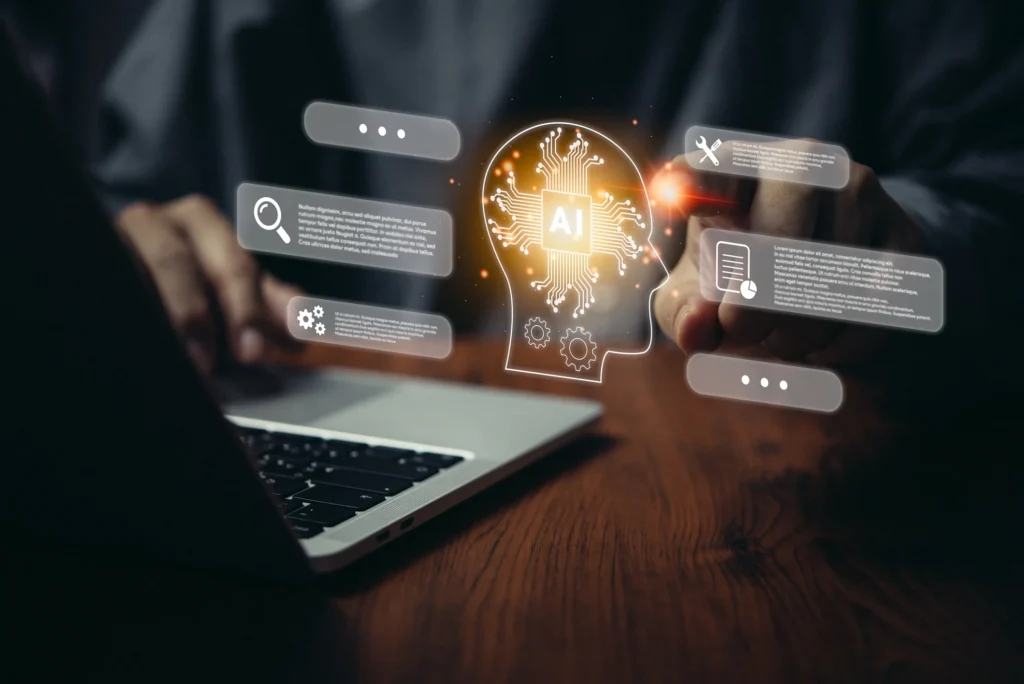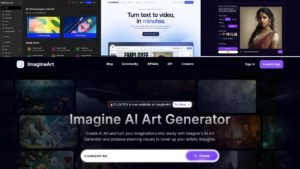This guide covers everything you need to know about how to use AI in marketing—including best practices for getting started.

Artificial intelligence (AI) has been around for years, but its impact on marketing skyrocketed after the release of ChatGPT in November 2022. ChatGPT demonstrated how generative AI could produce natural, human-like text, unlocking new ways to engage customers, create content, and boost marketing efforts.
But first, let’s define AI. Think of it as a super-intelligent assistant that can analyze marketing data, recognize patterns, and suggest the best next steps. AI works through technologies like:
1. Machine Learning (ML): ML enables computers to learn from data without being explicitly programmed. In marketing, ML can predict customer preferences, enhance ad targeting, and assess campaign performance.
2. Natural Language Processing (NLP): NLP allows machines to understand and respond to human language, powering chatbots and virtual assistants that can engage with customers naturally.
3. Large Language Models (LLMs): LLMs are advanced AI systems trained to generate human-like responses, helping marketers create personalized content, draft emails, and even write blog posts.
Benefits of AI in Marketing
AI brings many advantages to marketing, helping companies become smarter, more efficient, and more effective. Here are some of the key benefits:
1. Personalization at Scale
AI allows marketers to deliver highly personalized content by analyzing customer data such as browsing history, past purchases, and engagement patterns. This level of personalization leads to higher engagement, increased satisfaction, and improved customer loyalty.
2. Efficiency and Automation
AI can automate repetitive tasks like monitoring social media or answering customer queries. This frees up time for marketers to focus on strategy while maintaining consistency and accuracy in customer interactions.
3. Data-Driven Insights
AI processes and analyzes vast amounts of data quickly, allowing marketers to gain valuable insights into customer behavior and market trends.
4. Improved Customer Experience
AI-powered chatbots provide instant responses, improving response times and customer satisfaction. AI can even predict and address issues before they escalate, ensuring a proactive approach to customer service.
5. Smarter Marketing Spend
AI helps marketers allocate budgets effectively by identifying the most profitable channels and strategies, allowing businesses to optimize their marketing investments.
6. Precise Targeting
AI can segment audiences more precisely by analyzing demographics, behavior, and preferences, leading to more effective marketing campaigns.
7. Creative Assistance
Generative AI can help marketers create content faster, whether it’s writing copy, designing visuals, or producing videos. AI also enables testing various creative elements to find the best-performing options.
Challenges of AI in Marketing
Despite the benefits, AI in marketing poses certain challenges:
1. AI Bias
AI models can develop biases based on the data they are trained on. If this data reflects existing prejudices, the AI could produce skewed results, leading to less effective marketing campaigns.
2. Data Privacy
AI often relies on sensitive customer information such as browsing history and purchasing behavior. Mishandling this data can lead to breaches, damaging trust and risking penalties.
3. Complexity and Skill Gap
AI systems can be complex, requiring specialized knowledge to set up and maintain. Many marketing teams may lack this expertise and need to invest in training or hire new talent.
4. Integration Issues
Legacy systems in many organizations aren’t always compatible with AI technologies, which can cause inefficiencies and data silos.
5. Transparency
AI algorithms can sometimes be opaque, making decisions without clear explanations. This lack of transparency can hinder marketing efforts where understanding the “why” behind decisions is crucial.
How to Use AI in Marketing: 9 Tips for Success
To get the most out of AI in marketing, follow these best practices:
1. Set Clear Goals: Identify what you want to achieve, whether it’s improving engagement, boosting sales, or enhancing the customer experience.
2. Invest in Quality Data: High-quality data is essential for AI to produce meaningful insights. Ensure your data is clean, relevant, and accurate.
3. Choose the Right Tools: Find AI tools that align with your goals and integrate with your current systems. Prioritize ease of use and scalability.
4. Keep Humans in the Loop: AI should complement human efforts, not replace them. Strike a balance between automation and human interaction to maintain a personal touch.
5. Monitor and Adjust: AI requires ongoing attention. Regularly assess performance and adjust your AI marketing strategies based on data-driven insights.
6. Foster Collaboration: Work closely with IT, data science, and customer service teams to ensure smooth AI implementation and continuous improvement.
7. Educate Your Team: Invest in training to help your marketing team effectively leverage AI tools and strategies.
8. Experiment: Continuously test different AI-driven tactics, such as A/B testing subject lines or experimenting with audience segments.
9. Consider Sustainability: Look for AI solutions designed with energy efficiency in mind to minimize environmental impact.
Real-World Examples of AI in Marketing
AI is already making waves in marketing. Here are some notable examples:
• Chatbots: Companies like Sephora use AI-powered chatbots to provide personalized recommendations, improving customer engagement.
• Predictive Analytics: Retailers like Target use AI to forecast customer behavior and send personalized offers based on shopping habits.
• Dynamic Pricing: Airlines and ride-sharing companies adjust prices in real time with AI-driven dynamic pricing, maximizing profits during high demand.
• AI-Generated Content: The Washington Post uses AI to generate news reports during events like the Olympics.
• Social Media Listening: Starbucks uses AI tools to monitor brand mentions and gauge customer sentiment, allowing real-time feedback.
The Future of AI in Marketing
As AI continues to evolve, its role in marketing will only grow. Here are some emerging trends:
1. Hyper-Personalization: AI could soon create custom video ads tailored to individual viewers.
2. AI-Powered AR and VR: AI will make augmented and virtual reality experiences more interactive and personalized.
3. Emotion AI: AI could analyze customer emotions to tailor marketing messages based on mood and tone.
4. AI and Blockchain: Blockchain and AI together could create a more secure and efficient digital marketing ecosystem.
5. Sustainable AI: Marketers will focus on minimizing the environmental impact of AI tools and technologies.
6. AI-Driven Market Research: AI can conduct real-time market research by analyzing vast amounts of unstructured data from social media and other sources.
7. Autonomous Marketing: The future could see fully autonomous marketing systems that manage campaigns with little human intervention.
Final Thoughts
AI in marketing is no longer a buzzword—it’s a powerful tool that is transforming the industry. By embracing AI-driven strategies and tools, marketers can gain valuable insights, boost engagement, and achieve better results across all areas of their marketing efforts.


